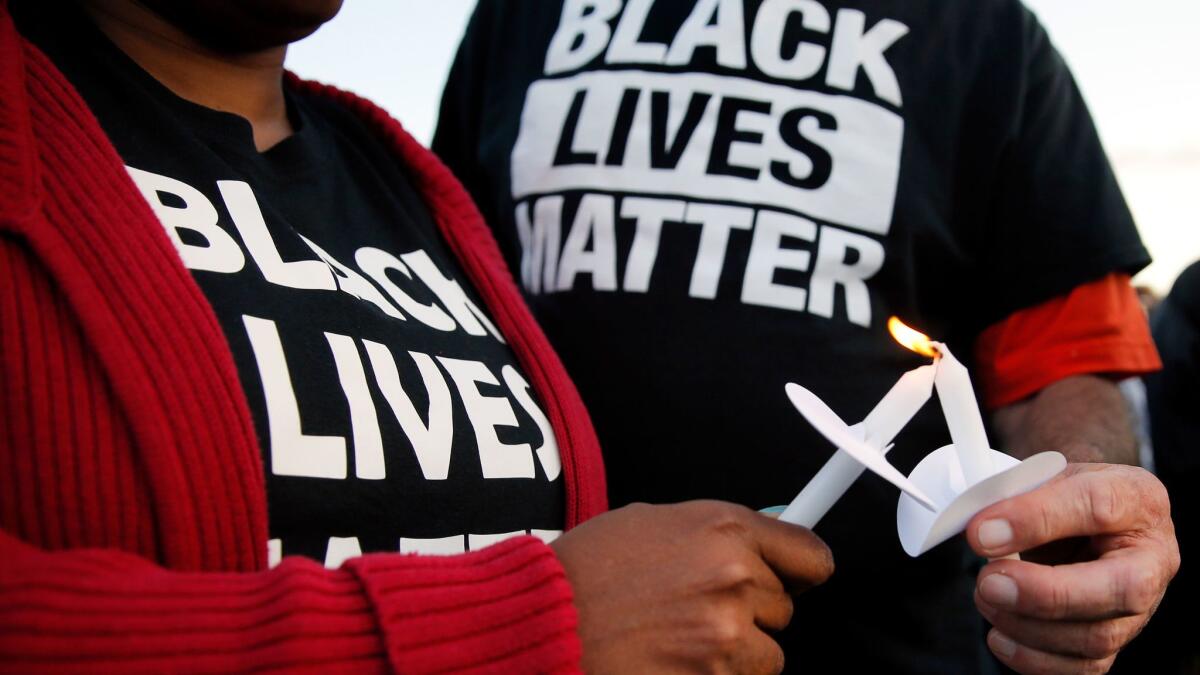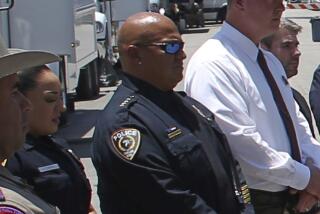The killing of Jordan Edwards shows again how black males — even children — are viewed as a threat

The car drove away from the high school house party, down a street in a Dallas suburb dotted with single-level brick homes, when the police officer raised his rifle and fired.
A bullet tore through the front passenger window, killing an unarmed 15-year-old: Jordan Edwards.
As the death reignited a national conversation about race and the police, it’s also elevated what’s viewed as a well-understood fact in many African American communities: When you’re black — even if you’re a child — you can be viewed as a threat to police.
“These are trained professionals, who are supposed to make rational decisions, but they’re not,” said Benjamin Crump, a civil rights attorney and former president of the National Bar Assn., a network of black lawyers and judges. “And yet again our children — I repeat, children — are paying the ultimate price.”
Crump spoke Saturday, the day a funeral was held for Jordan, a freshman who played on the Mesquite High School football team. A white hearse carried his body from a Baptist church to the cemetery, and teammates attended the burial wearing their white-and-maroon jerseys.
Hours before the funeral, former Balch Springs police officer Roy Oliver walked out of jail after posting $300,000. Oliver, 37, was arrested Friday and charged with murder. He was fired from the Balch Springs Police Department for what Chief Jonathan Haber called “violations” in protocol.
Jordan’s death echoes other police shootings involving black boys that have riled the country.
In November 2014, Cleveland police got a 911 call about someone brandishing a pistol near a park — the weapon, the caller said, was “probably fake.” Still, soon after — in an incident captured on camera — a police cruiser pulled into the park.
Officer Timothy Loehmann jumped out and opened fire and, within seconds, 12-year-old Tamir Rice was dead.
Even before Tamir’s death the Department of Justice had been investigating the Cleveland Police Department. A month after his shooting, it released a report saying Cleveland police displayed a pattern of using unnecessary force.
A year later, a grand jury decided not to indict Loehmann in Tamir’s death, saying he had reason to fear for his life.
Last year, in Columbus, Ohio, police shot and killed Tyre King, 13, who was carrying a BB gun while running from police. The case is set to go before a grand jury to see if any criminal charges will be filed.
Chanda Brown, a Columbus-based attorney who represents the King family, said Saturday that the lives of young black males are not being valued.
“These are not violent events, yet we’re seeing police go straight to lethal force,” Brown said. “Just being black can be threatening to police and others.”
A 2014 study released by the Journal of Personality and Social Psychology found that black children are more likely to be the subjects of dehumanization by police officers, in turn making them subject to higher rates of police violence.
“Children in most societies are considered to be in a distinct group with characteristics such as innocence and the need for protection. Our research found that black boys can be seen as responsible for their actions at an age when white boys still benefit from the assumption that children are essentially innocent,” Dr. Phillip Atiba Goff, one of the study’s authors, told the American Psychological Assn. at the time.
Parallels from the study could be seen in the case of Trayvon Martin, 17, whose death triggered protests around the country. He was not shot by a police officer, but George Zimmerman, the neighborhood watch volunteer who killed him, viewed the teen as a threat.
In 2012, as Martin walked home from a convenience store in Sanford, Fla., Zimmerman, then 28, called 911 to report that the teen appeared to be “up to no good.” Martin wore a hoodie and carried a bag of Skittles and a can of iced tea. The two got into a physical altercation, during which Zimmerman fatally shot the unarmed Martin.
“More and more we have to prepare our children for what’s ahead and how society will view them,” said Crump, who helped represent Martin’s family in legal proceedings.
It’s not a crime to be young and black.
— Reggie Miller, chairman of the National Black Police Assn.
Reggie Miller, chairman of the National Black Police Assn., which, among other things, seeks to forge better relationships between police and minority communities, said diversity training could help.
“It’s not a crime to be young and black,” he said. “But some officers see a do-rag or dreads and feel threatened. More understanding is needed.”
Cheryl Dorsey, a retired LAPD sergeant, said that more must be done by police on the front end to prevent such shootings.
“Do a lot of police feel that their lives are threatened? It’s doubtful,” Dorsey said. “I think it’s what’s put forward to justify shootings.”
The events leading to Jordan’s death played out the night of April 29, after police responded to complaints about a loud house party in Balch Springs. Oliver initially told investigators the car Jordan was riding in backed up aggressively toward officers. But Haber, the police chief, said body-camera video found the car was pulling away from officers. Oliver was fired the following Tuesday.
Four years ago, Oliver was suspended for 16 hours and required to take anger management courses for his conduct while serving as a witness in a drunk driving case.
On social media, the hashtag #JordanEdwards has been trending in honor of the slain teen.
“The consistent rage I feel in response to Black folks dying prematurely is debilitating,” tweeted Patrisse Cullors of Los Angeles, a leading force behind the Black Lives Matter movement.
Speaking by phone from his offices in Tallahassee, Fla., Crump said Saturday it came as a relief that prosecutors acted swiftly in charging Oliver with murder just six days after the shooting.
The charges against the officer came the same week there were developments in two other high-profile cases involving police and black males, adults in these cases.
A white former South Carolina police officer, Michael T. Slager, pleaded guilty to violating the civil rights of Walter Scott when he shot and killed the unarmed man two years ago. Meanwhile, the Department of Justice declined to bring charges against white police officers involved in the shooting death of Alton Sterling in Baton Rouge, La. After a 10-month investigation, authorities said there was insufficient evidence to prosecute the officers.
Twitter: @kurtisalee
ALSO
More L.A. residents fear a repeat of 1992 riots. Here’s the view from the street
‘Shots Fired’ creators want to ‘put a human face’ on the volatile issue of police shootings
Dept. of Justice won’t file charges against Baton Rouge police officers in Alton Sterling’s death
More to Read
Sign up for Essential California
The most important California stories and recommendations in your inbox every morning.
You may occasionally receive promotional content from the Los Angeles Times.











